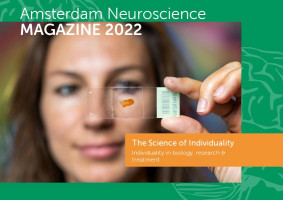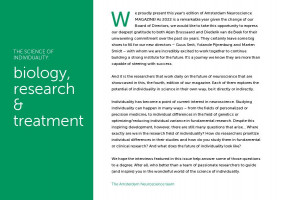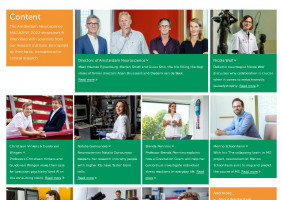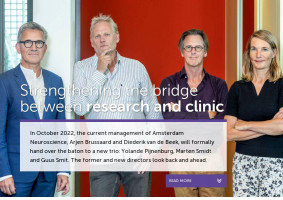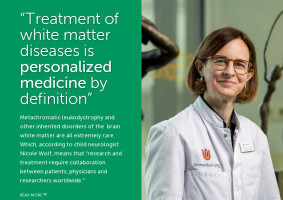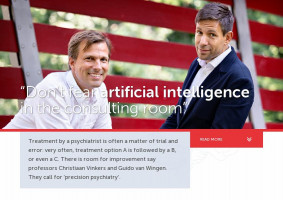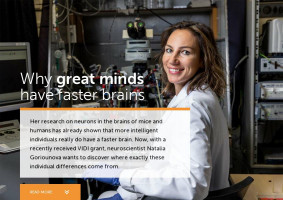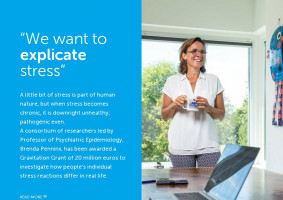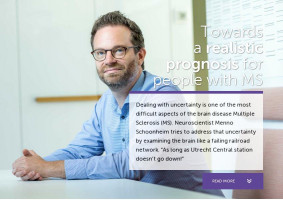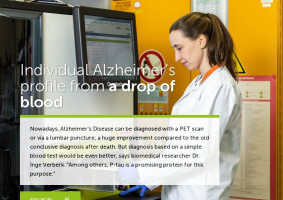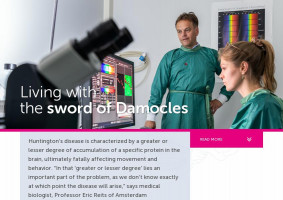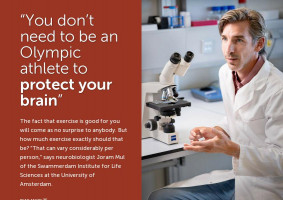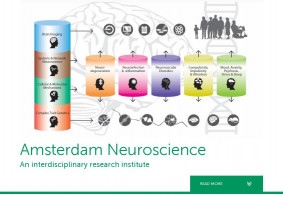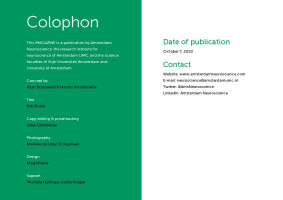“Professor Arjen Brussaard is not shy to admit he looks back with pride on the first six years of Amsterdam Neuroscience. “When the merger of VUmc and AMC into Amsterdam UMC took place, it was logical that joint research would build the proverbial bridge across the Amstel,” he says. “To this end, eight research institutes were established in 2016, of which Amsterdam Neuroscience was one. From the very beginning, we chose to not only have the well-known translational medicine take place between benches and bedsides of both hospitals, but to also explicitly involve the life science faculties of both Amsterdam universities. This has enabled us to truly combine the best of both worlds.”
Arjen Brussaard and Diederik van de Beek
Arjen Brussaard, professor of Translational Medicine in Neurology and Psychiatry at the Vrije Universiteit Amsterdam, has led Amsterdam Neuroscience since its start in 2016. Prior to that, Brussaard also led the Neuroscience Campus Amsterdam, the forerunner of Amsterdam Neuroscience.
On January 1, 2022, co-director Diederik van de Beek, neurologist at Amsterdam UMC and professor of Neurological Infectious Diseases at the University of Amsterdam, passed his seat in the boardroom to neurologist professor Yolande Pijnenburg.
Value of data
Whereas his fellow board member, neurologist Diederik van de Beek, focused mainly on clinical strategy, Brussaard concentrated on the collaboration with external parties from the biotech and pharmaceutical industries. “These external funders have become increasingly important in recent years,” says Brussaard. “But the tripling of the amount of external funding was never a goal in itself. Although, it was a useful means to an end. A lot of innovative research has been made possible through this collaboration. Meanwhile, we continuously monitor the integrity and independence of our institute. Collaborations with the pharma industry must fit our mission, but it should also be possible to assign a market-based value to, for example, the information from patient cohorts and other data that we generate in-house.”
Colored by COVID-19
The end of his period as director was unavoidably also colored by COVID-19, Brussaard acknowledges. “But that is where the resilience of the institute became apparent. Events were organized like TV productions, for example. These new ways of meeting each other should remain a focal point for the future of our institute. Bear in mind that a large proportion of our colleagues at the institute is younger than 35 years of age. We will have to bring all those previously unconnected researchers together more than ever, for example in an internal ‘research market’. We should make it clear across the whole breadth of Amsterdam Neuroscience what is on offer and what opportunities for collaboration there are.”
Yolande Pijnenburg
Amsterdam Neuroscience’s new board member Yolande Pijnenburg is a neurologist at Amsterdam UMC, medical director of the Alzheimer Center Amsterdam and professor of Young-Onset Dementia at the Vrije Universiteit Amsterdam. Pijnenburg wants to strengthen translational research, stimulate the connection between both locations of Amsterdam UMC, and intensify the relationship between the neurology and psychiatry fields.
Cross-disciplinary research
New co-director Yolande Pijnenburg acknowledges that this bringing together of researchers from all areas will be increasingly important. “I have been a part of the institute since the beginning, but only now, since becoming a board member on January 1, do I truly understand what we have to offer in terms of potential collaborations. In my own field, research in early-onset dementia, for example, I never realized what the potential added value was of research in fields such as autism or schizophrenia. That message of cross-disciplinary research needs to be even stronger than before.”
Serendipity
Pijnenburg also pledges for more ‘fun and serendipity’, as she jokingly calls it. “To work on your own in an office on your PhD thesis can be very lonely. Your professional career can be so much more fun if you meet other researchers, free from borders of disciplines or hierarchy, to brainstorm about your work. And while discussing your work with others, serendipity may bring up new angles that you had never thought of otherwise.”
Marten Smidt
Amsterdam Neuroscience’s new board member Marten Smidt is professor of Molecular Neuroscience at University of Amsterdam’s Swammerdam Institute of Life Sciences. Smidt is also the co-founder and co-CEO of Macrobian-Biotech, a spin-off company that develops novel medication to treat and stop the progression of Parkinson’s disease. As co-director of Amsterdam Neuroscience, Smidt will draw attention to the importance of fundamental research and the generated valorization potential.
Consolidate
New co-director Marten Smidt agrees that consolidating this initial course is of high priority. “We need to take into account, though, that research and clinic sometimes speak completely different languages. While carrying out research on the Pitt-Hopkins syndrome, for example, a geneticist may think mainly in terms of gene-expressions in the medulla, while a clinician primarily sees the problems this may cause in respiration. Collaboration within Amsterdam Neuroscience has the potential to bring these worlds together.”
Take time
Smidt is firmly determined to build and strengthen more bridges between people that may know of each other, but do not know yet that they can mutually benefit from each other. “The culture on the work floor does not help either,” Smidt believes. “We should stop taking for granted that we ‘must’ work persistently for 60 to 70 hours per week. Let’s take time to actually meet each other. If we, as new directors, can be the ones to build these new bridges, that would be a great endeavor.”
Guus Smit
Amsterdam Neuroscience’s new board member Guus Smit has been scientific director of the Center of Neurogenomics and Cognitive Research at Vrije Universiteit Amsterdam since 2011. As a board member, Smit intends to focus on all aspects of the Amsterdam Neuroscience organization, including new scientific opportunities, scientific quality control, appointments, graduate training, campus development and core facilities. As of October 1, 2022, Smit will be acting as the chair of the new board of directors of Amsterdam Neuroscience.
Use the facilities
Apart from this personal level of cooperation, new co-director Guus Smit emphasizes that many of the splendid facilities at Amsterdam Neuroscience need to be placed in the spotlight as well. “Within our institute, there’s top-notch imaging facilities, sequencers, biobanks, you name it,” he says. “We really need to promote them, to take full benefit of the possibilities they offer.”
A neuroscience umbrella
Smit agrees with his fellow directors-to-be that their predecessors have already done a great job in bringing people together. “We all work under this great umbrella of Amsterdam Neuroscience, and I think we should continue to ‘brand’ this and tell our story. If we start using the Amsterdam Neuroscience identity more clearly, this will enhance the sense of community and, as a bonus, enhance the visibility of the institute. This is just as important internally as it is for the outside world; people and the researchers within our institute need to know what Amsterdam Neuroscience stands for, what we do and therefore what they are part of.”
Photography: Marieke de Lorijn
